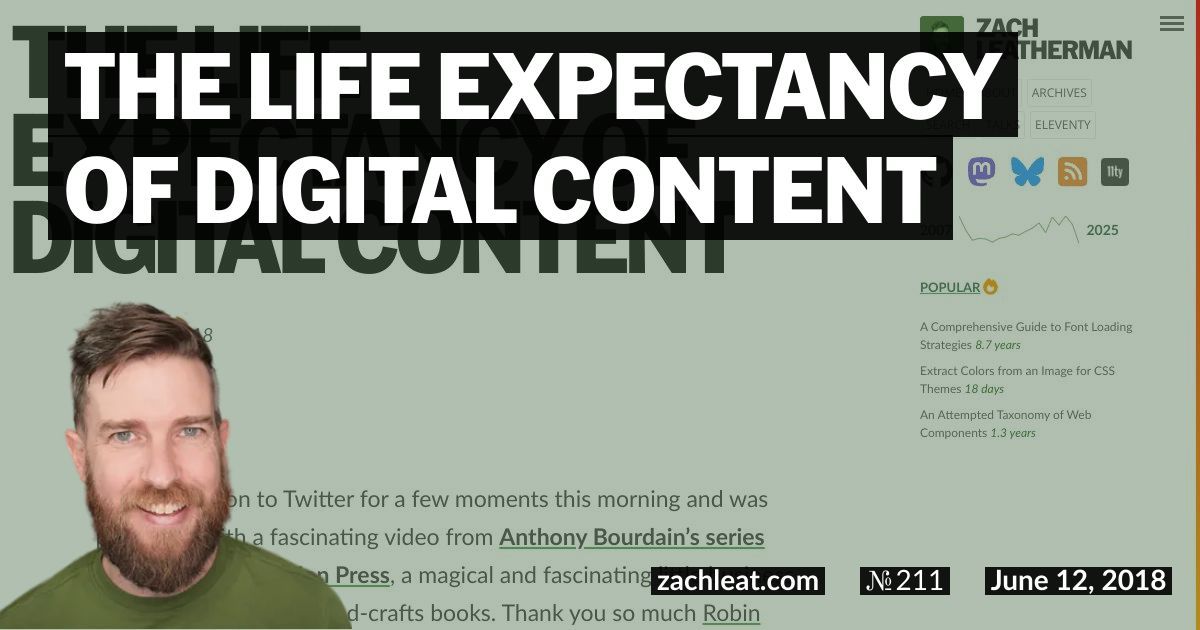The Life Expectancy of Digital Content
I snuck back on to Twitter for a few moments this morning and was presented with a fascinating video from Anthony Bourdain’s series Raw Craft on the Arion Press, a magical and fascinating little business in San Francisco that hand-crafts books. Thank you so much Robin Rendle for sharing this.
Watching these master craftspeople in their element left me in awe of the amount of respect that goes into a single book. The typesetting, the printing, the sewing and binding, the proofreading. It’s reminiscent of monastic scribes carefully and artfully crafting every page, spending their waking lives crafting manuscripts comprised of words written by other people. I pray their work always have enough demand to justify their continued existence.
I particularly enjoyed this gem:
“If ever there were a time to be making books, that’s exciting, say within the last century—I would say now is that moment. The interweb has really relieved the burden of the encyclopedia from the book. So we’re in this very unique moment now where it can be restored to it’s certain sparkly self. It’s kind of up to all of us to figure out what that book will look like in the 21st century.”—Blake Riley
“Relieved the burden of the encyclopedia from the book.” Wow.
Seeing this bookmaking in action has me wondering about the longevity of digital content, too. The web was an antidote to closed document formats and revolutionary because of its ubiquitous accessibility. But when you’re thinking on a bigger scale, in comparison to a lovingly crafted book, even the most open of digital formats—raw HTML on the web—sacrifices longevity for access and ubiquity. It’s tough to imagine that any digital content that you or I create or maybe even consume will be around in the same way that an intergenerational book lives on, passed from parents to children.
On my bookshelf lives a copy of Macbeth printed in 1905, aged out of the small town local library where my grandmother spent her time as a lover of books—a job title known to most in the town as librarian. It seems both inevitable that the text Macbeth still exist today and unlikely that this particular printed copy of Macbeth survived 113 years.
On the same note it seems overwhelmingly unlikely that jumping ahead the same interval of time—to the year 2131—that any modern day digital copies of Macbeth will still exist. Would any current digital incarnation of the text survive? What about the darling of openness, the HTML file? I want to believe! But I’m skeptical.
Macbeth will continue to be re-encoded and resold in new formats with new annotations and metadata as the locomotive of capitalism chugs forward, and I see nothing wrong with that. It’s a little strange given that Macbeth (and all plays of Shakespeare) are available in the public domain. Yes, free. Yet the demand to pay for the content exists—you can buy MacBeth on the Kindle store right now for hard earned cash—but it’s the accoutrement (the value-add if you nasty) that has modern day monetary value.
Don’t get me wrong, accessibility to content is a benefit to society, even when couched deep in the cushions of the Amazon loose-change money-making machine. Any Macbeth is better than no Macbeth, as if those were the only options. However, dear reader, you may already know that our options are not limited to these extremes!
We may be trapped in a web of competing formats, open and closed, standardized and proprietary, single vendor controlled and community driven, available for all and tightly held in app stores and behind walled gardens. We’re trapped in a continuum of open and closed continuously exploited for profit that plays a huge role in the longevity of our digital files.
Digital content longevity will continue to be highly variable, depending only in part on the file format used. HTML has existed for about 27 years and I wouldn’t venture a guess to say how much longer it’ll go. I can say that a reduction in ceremony around opening and reading a file is better for that file’s longevity. Relatedly, the ubiquity of software necessary to read a file lends to its future proofing as well. And what software has been historically and continues to be more ubiquitous than the lowly web browser? I’m not sure such software exists.
So feel free to keep creating your content in Microsoft Word or in Markdown or using JSX or Mustache templates or in your WordPress database. But if you want the content to live a full and happy life, publish it in HTML on the web.

